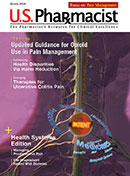Aarhus, Denmark—Guidelines usually recommend a once-daily aspirin dose for the prevention of cardiovascular disease (CVD). A new study suggests, however, that might not be enough in patients with type 2 diabetes (T2D).
The study, presented at the recent European Association for the Study of Diabetes Annual Meeting in Lisbon, Portugal, instead recommends twice-daily dosing.
Researchers from Aarhus University Hospital in Denmark explain that aspirin works by reducing platelet aggregation, i.e., making blood platelets less likely to form clots, thereby reducing stroke or heart attack risk.
Background information in the report points out that, because aspirin has a very short half-life, some past studies have suggested that a once-daily aspirin regimen does not fully inhibit platelet function when platelet turnover is increased, as seen in people with T2D. In fact, the authors note, aspirin is known to be less effective in people with T2D and a history of CVD.
The recent study sought to determine if that also is true in T2D patients without a history of CVD. The study team explored platelet aggregation increases during the 24-hour dosing interval in 21 people with T2D without CVD and sex-matched healthy controls. In the investigation involving 1 week of low-dose aspirin treatment, researchers also gauged whether patients with T2D had increased platelet turnover compared with the control group.
To determine how the participants’ platelet function responded acutely to aspirin and to evaluate platelet aggregation levels prior to aspirin treatment, blood samples were drawn at the start of the study and 1 hour after intake of 75 mg of aspirin. Six days of once-daily aspirin followed, with blood samples repeated 1 hour and 24 hours after intake of aspirin to compare platelet aggregation levels during the dosing interval.
Results showed that aspirin-treated patients with T2D without a history of CVD had a time-dependent increase in platelet aggregation through the standard 24-hour dosing interval, which also was observed in the control group.
Based on that, study authors posit that the ability of aspirin to inhibit platelet aggregation, and thus prevent CVD by stopping the formation of clots, had declined during the dosing interval when aspirin was only ingested once daily. Because T2D patients have an increased risk of CVD, they suggest an antiplatelet treatment that covers the entire dosing interval should be preferred—with twice daily dosing of aspirin a way to accomplish that.
“Given that platelets in people with diabetes are characterized by increased aggregation and increased turnover rates, our study indicates that patients with type 2 diabetes may achieve additional benefit from twice daily rather than once daily dosing of aspirin,” the researchers conclude. “Large-scale clinical outcome trials are needed to confirm the safety and efficacy of this approach.”
« Click here to return to Weekly News Update.
Published September 27, 2017





